It’s time to give bees their due – find out why pollinators are vital to a thriving and healthy ecological system.

What do Clean Eating favorites like almonds, strawberries, pumpkins, blueberries and mango have in common? Without pollinators, they couldn’t exist. While that may sound like a quaint elementary school science lesson, you might be surprised to discover that bees are one of the biggest topics buzzing around “good food” conversations today. Here’s why they matter for a healthy diet and a greener world.
Why Pollinators Are the Bee’s Knees
Bees do far more for your diet than create delicious honey. As pollinators, they are the hidden heroes of the food system, playing a crucial role in producing more than one-third of the world’s food crops. The economic value of the services they perform reaches into the billions (they pollinate more than $15 billion worth of crops) – though they do it free of charge. In practical terms, one in every three bites of the food you eat depends on bees, including crops such as certain fruits, vegetables and nuts that are the cornerstone of a healthy diet. And, if you’re a coffee drinker, well, guess what: Coffee beans depend on bees, too. In fact, bees are so fundamental to the food chain that they have a special name: They’re known as a “keystone species,” meaning they play a disproportionately large (and environmentally critical) role in an ecosystem relative to their abundance in that ecosystem.
Denne historien er fra June 2017-utgaven av Clean Eating.
Start din 7-dagers gratis prøveperiode på Magzter GOLD for å få tilgang til tusenvis av utvalgte premiumhistorier og 9000+ magasiner og aviser.
Allerede abonnent ? Logg på
Denne historien er fra June 2017-utgaven av Clean Eating.
Start din 7-dagers gratis prøveperiode på Magzter GOLD for å få tilgang til tusenvis av utvalgte premiumhistorier og 9000+ magasiner og aviser.
Allerede abonnent? Logg på
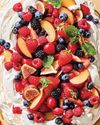
Summer Lovin'
Bushels of berries, peaches, nectarines, cherries, plums and more beckon at the market. Buy them all and soak up the sun in these bejeweled desserts.
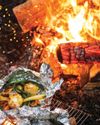
Into the Wild
Cooking along the 500-mile Colorado Trail taught Clean Eating editor Amanda M. Faison how to transform the campfire into a kitchen.
![[ Three Ways ] Tropical Punch [ Three Ways ] Tropical Punch](https://reseuro.magzter.com/100x125/articles/6144/994436/qSC8RoLOC1657772079105/crp_Hibiscus-Jamaican-sorrel-Recipes.jpg)
[ Three Ways ] Tropical Punch
Of African origin, hibiscus or Jamaican sorrel, is an important staple in West Indian and Mexican cooking. Hibiscus is sour enough to make you pucker and tropical enough to evoke the islands. Popularly brewed as a tea, the dried petals play well in savory or sweet recipes, too.
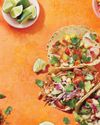
You Had Meat Tacos
"When it's done properly, taco should be a verb," declared Jonathan Gold, the late restaurant critic of the Los Angeles Times. Tacos are much more than a meal; they're an action.
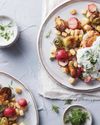
The Multitasker
Collagen usually makes headlines for its skin-saving benefits. But did you know that it's also an essential nutrient for joint health? (Especially if you sit at a desk all day.)
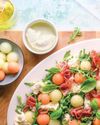
The Minimalist
Summer cooking is all about fresh and fast and avoiding the stove.
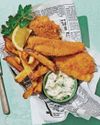
Lighten Up
If you've had an air fryer in your online cart since the start of the pandemic, it's time to commit. Let's just say it'll change your life.
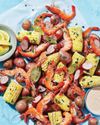
JUST RIGHT
The classic low-country boil is a celebration of place, tradition and ratio.
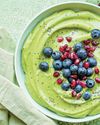
Recovery Days
The mantra that food is fuel is gold, but food as refuel is equally valuable.
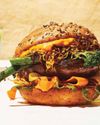
Lower your impact without sacrificing satisfaction.
Eat like a Reducetarian.